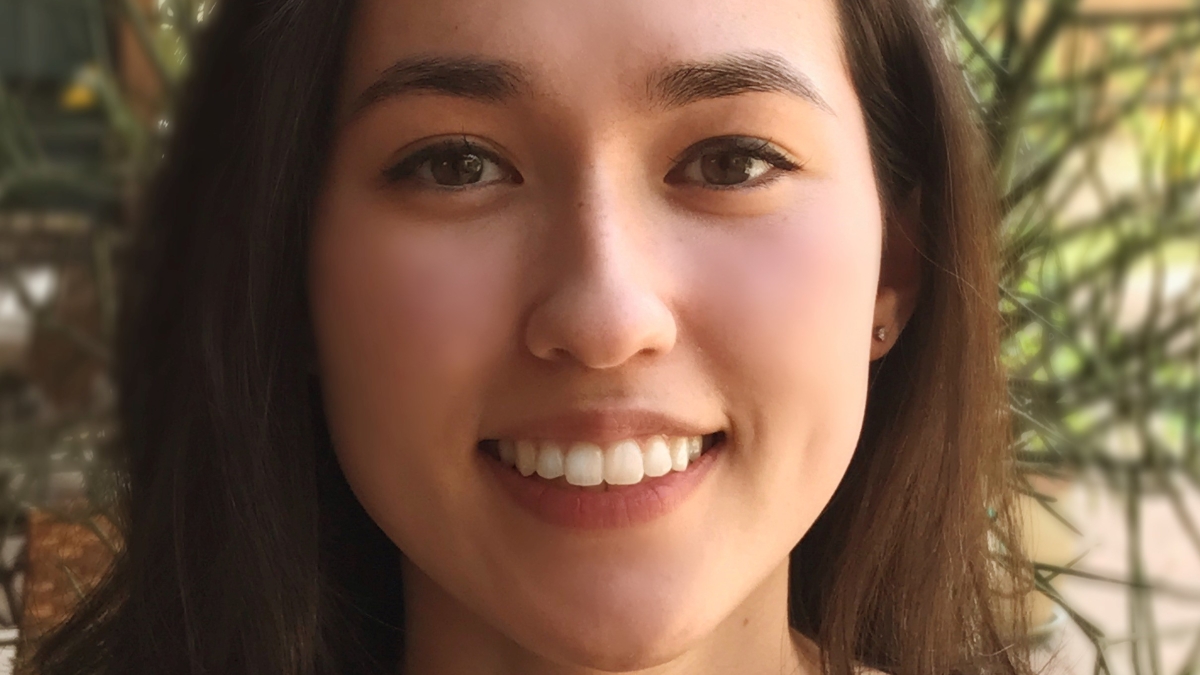Barrett student combines interests in health, supply chain management

Hannah Murphy will graduate with a degree in supply chain management and a minor in mathematics, with honors from Barrett, The Honors College at ASU. She will be recognized at honors convocation on May 9 with Barrett’s Outstanding Student for Research Award. She is a recipient of the President’s Scholarship and was a Barrett Mayo Clinic Premedical Scholar. She was involved in community service at Night of the Open Door, the Boys Team Leadership Conference, Pat’s Run and the St. Mary’s Food Bank. Her research portfolio in object-oriented programming and data structure has produced five research articles in top-ranked publications, including a solo-authored paper. She hopes to pursue a career in health care.
Editor’s note: This is part of a series of profiles for spring 2017 commencement. See more graduates here.
In the summer after her sophomore year at Arizona State University, Hannah Murphy worked as an intern in the supply chain department of HonorHealth, the largest independent, six-hospital consortium in Phoenix.
During the first week, she learned how difficult it is to track supplies and control costs in a hospital. The inefficiencies in the system that she saw sparked a desire to solve hospital supply chain problems. The experience also rekindled a childhood love of being in the hospital.
As a child, Murphy visited hospitals where her father, who is a radiologist, worked. As she sat in the “reading room,” her father would show her examples of all kinds of medical situations, from tumors to herniated discs. She was intrigued and a little intimidated by the many different ailments.
Murphy thinks she really always wanted to be a doctor, but due to the rigors involved with medical school and residency, her parents dissuaded her from a career as a physician. Her dad, a busy doctor, always told her that medicine was becoming an even more challenging field due to the macro changes in health care. She instead decided to study supply chain management and found the concepts interesting and the professors in the department very stimulating. She also obtained a minor in mathematics and took a number of computer science courses.
After really enjoying CSE 205 (Object-Oriented Program & Data), she decided to pursue research with her thesis director, Sharon Hsiao from the School of Computing, Informatics, & Decision Systems Engineering.
“I liked that her research is focused on improving the education of programming students,” Murphy said. “I've always been interested in learning best how to learn, and I thought it would be fun to help other students do the same.”
Murphy has authored a paper that appeared in an international computer science education conference proceeding, and she has also co-authored two research articles and a journal article.
“Research is about solving problems. Though the process is challenging, I’ve found it very satisfying to analyze our data, understand the implications of the data, and be able to report the results. I know that I will use the skills that I’ve gained from this experience in the future,” she said.
Murphy also volunteered with the Mayo Clinic and at different events on the ASU campus such as the annual Devils in Disguise and Night of the Open Door. She served as the vice president of administration and philanthropy chair of Business Ambassadors, the principal recruiting organization of the business school. Through ASU, she also had the opportunity to shadow different physicians at the Mayo Clinic. This past spring, she worked as an undergraduate and graduate teaching assistant in the supply chain department.
Murphy’s path to this point has taught her a lot about herself, supply chain management, health care, education and research. She looks forward to the day when she can work with patients one-on-one but hopes to be engaged in the supply side of health care improving efficiencies, lowering communication barriers and ultimately helping to control health care costs.
“The lessons that I learned as an intern at HonorHealth, as a student in supply chain management and as a researcher show me that solving these problems could allow doctors to deliver care to more patients,” said Murphy, who is from Scottsdale. “As a physician with an understanding and interest in the business of medicine, I hope to be a part of the larger solution for health care.”
Murphy will graduate with a degree in supply chain management from the W. P. Carey School of Business and a minor in mathematics, with honors from Barrett, The Honors College. She will be recognized at honors convocation on May 9 with Barrett’s Outstanding Student for Research Award. Murphy, who was a Barrett Mayo Clinic Premedical Scholar, talked about her time at ASU.
Question: What was your “aha” moment, when you realized you wanted to study supply chain management?
Answer: My "aha" moment was in Eddie Davila's SCM 300 course during my sophomore year at ASU. It was in that class that I realized how important supply chain management truly is. It is in everything. Every company, business or organization (even a hospital) provides some form of good or service, and this cannot be done without efficient supply chain management. I also knew that ASU's supply chain management major is a great program and ranked No. 3 in the nation.
Q: What's something you learned while at ASU — in the classroom or otherwise — that surprised you, that changed your perspective?
A: Before I came to ASU, I thought that I had to do everything on my own in order to feel like I succeeded. Yes, YOU must put in the hard work, but I (and I'm sure many of my friends) will agree that we wouldn't be where we are at this point without the help and guidance of our peers, professors, advisers and mentors. I was surprised by the sense of community that I found at ASU, even though it is such a large university. People are kind and want to help. People want to give you advice. People want to share their experiences and their stories. Interestingly enough, as I've transitioned from a freshman to a graduating senior, I now sometimes find myself giving rather than receiving that advice.
Q: Why did you choose ASU?
A: I chose ASU because it is a large research institution that offers so many different opportunities. You can meet and connect with people who are world leaders in their field, you can create an academic program tailored to your unique interests, you can get involved in your community, you can stay fit by working out at ASU's huge fitness complex and you can do research in an endless number of areas (regardless of what your major or background is). I now know that I couldn’t have chosen a better school than ASU!
Q: What's the best piece of advice you'd give to those still in school?
A: Never be afraid to take risks and try new things. Take advantage of any and all opportunities and never worry about whether or not you can do them. By the time you’re ready to graduate, you’ll realize how much you’ve grown.
Q: What was your favorite spot on campus, whether for studying, meeting friends or just thinking about life?
A: I always studied at a group of desks hidden between some bookcases on the third floor of Hayden Library. I also liked to meet up with friends at Engrained.
Q: What are your plans after graduation?
A: I plan to apply to medical school.
Q: If someone gave you $40 million to solve a problem on our planet, what would you tackle?
A: Forty million dollars isn't too much money to solve a worldwide problem, but I think I would like to use supply chain principles to get the right amount of the right education to more people so that they can make an impact. Education gives people the confidence and knowledge that they need to tackle problems on our planet.
More Health and medicine

ASU teams up with Maricopa County to address local life expectancy gap
Arizona State University’s College of Health Solutions is partnering with the Maricopa County Board of Supervisors to address a…

ASU professor named Rural Health Fellow
If you live in a major city, chances are you don’t spend much time thinking about what happens in smaller towns and rural areas.…

The rise of NoLo: Many young people opting to reduce alcohol consumption
This month, the U.S. surgeon general released a new advisory on the link between alcohol and cancer risk.The advisory includes a…